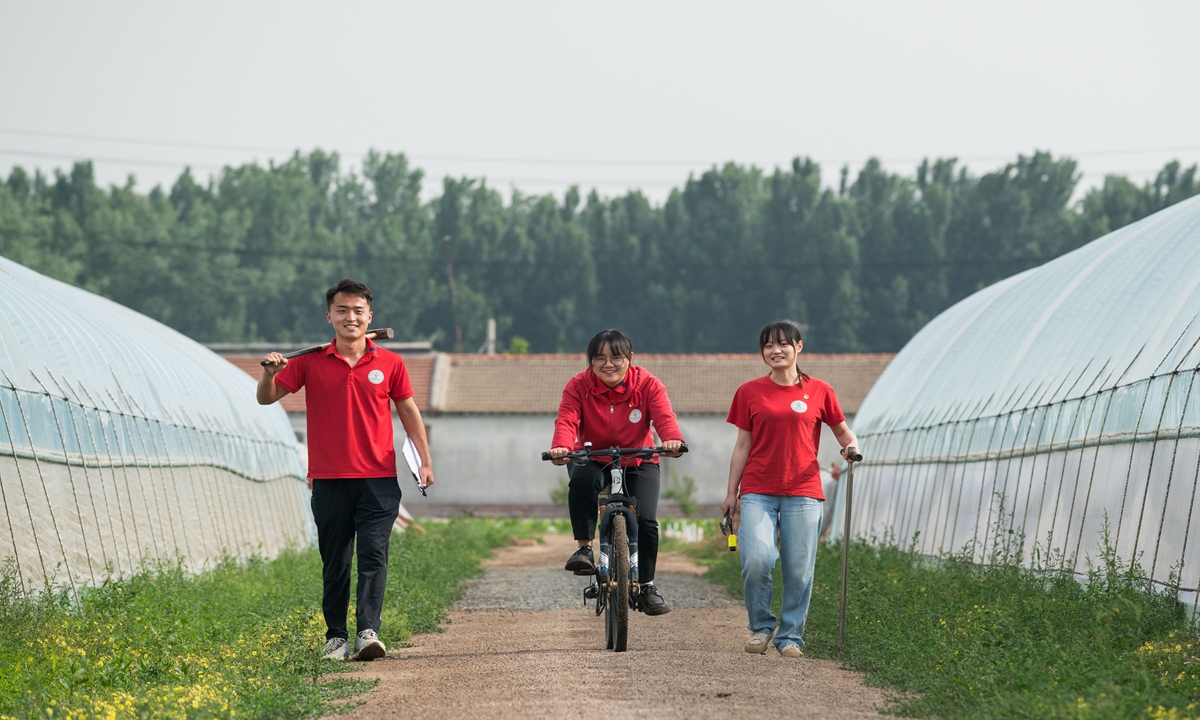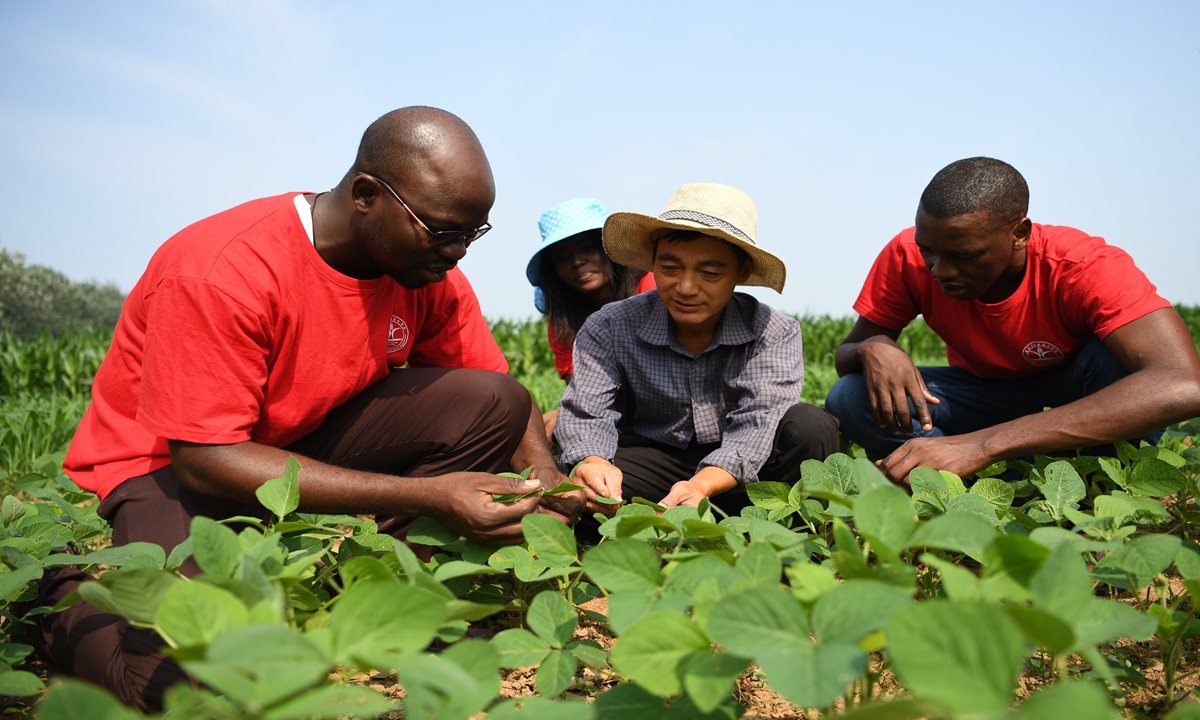
Students work in the "science and technology backyards" of the China Agricultural University in Xihuaizhuang village, Beijing, on May 28, 2023. Photo: Chen Tao/GT
Editor's Note:Chinese people believe that letters are as valuable as gold. For thousands of years, letters, across mountains and oceans, have delivered writers' sentiments and conveyed friendship and expectations.
Xi Jinping, general secretary of the Communist Party of China (CPC) Central Committee and Chinese President, has managed to find time to reply to some letters sent to him from different sectors of society and different parts of the world despite his busy work schedule.
Through his letters, Xi has corresponded with people from all walks of life on numerous occasions, as part of a series of excellent China stories in the new era.
The Global Times has traced and contacted some of the recipients of Xi's letters, to hear the inspiring stories behind the letters and their communications with the Chinese President.
Xihuaizhuang village in Tongzhou district, Beijing, is one of the remotest villages in the Chinese capital. It is located 60 kilometers and a three-hour public transport ride from Tian'anmen Square.
Far from the bustling city center replete with its sleek high rise buildings, the village is a truly rural, and this is where a cohort of university students is stationed. They work hard from dawn till dusk, engaging in agricultural activities, and describe it as "seeking hardship voluntarily."
These are students from the "science and technology backyards" of the China Agricultural University. They utilize their specialized theoretical knowledge to improve farmers' productivity, help them increase their incomes, and promote the adoption of more environmentally friendly production and lifestyle practices among farmers.
Xihuaizhuang village, for example, is renowned for its radishes, with a history of radish cultivation spanning a century. In recent years, students introduced many new varieties of radishes
- more colorful and flavorful, with some even tasting like ice cream. They have also assisted farmers in selling their products online, resulting in substantial income gains.
In 2009, the China Agricultural University pioneered the establishment of a "science and technology backyard" in Quzhou county, North China's Hebei Province. They dispatched postgraduate students majoring in agriculture to the frontlines of agricultural production.
The program aimed to study and solve practical problems in the development of agriculture in rural areas, train high-level agricultural talents, and encourage rural and agricultural modernization.
Currently, the university has established 139 "science and technology backyards" in 91 counties and cities across 24 provincial regions nationwide, with Xihuaizhuang "science and technology backyard" being one of them.
On May 4th, China's Youth Day, the students from the "science and technology backyard" received a special gift
- a reply letter from Chinese President Xi Jinping.
In the letter, Xi, also general secretary of the CPC Central Committee and chairman of the Central Military Commission, encouraged the students to make greater contributions to rural revitalization, the Xinhua News Agency reported.
Xi said he was gratified to know that the students went deep into the fields and villages to get to learn about people's wellbeing and gain knowledge through serving rural revitalization.
Replying to the students' remarks that they had learned to seek truth from facts and maintain close ties with the people only when they went deep into China's rural areas, Xi said that this is the spirit that Chinese youth in the new era should have.
The 20th National Congress of the Communist Party of China has made plans to shore up China's strength in agriculture, Xi said, hoping the students will closely integrate theory with practice in rural areas, and devote their youth and strength to speeding up rural and agricultural modernization and the construction of a modern socialist country.
Grassroots pioneersSitting under the Cangshan Mountain and facing Erhai Lake, Gusheng village in Dali, Southwest China's Yunnan Province is an ethnically traditional Bai village with a history spanning 2,000 years.
Since the beginning of 2022, a group of university students from Beijing have settled in this village, transforming the traditional ways of people's living and producing here.
The main research direction of the Gusheng Village "science and technology backyard" is to support the environmental conservation of Erhai Lake, realize farmer income increases, and promote the development of green agriculture in the watershed, the Global Times learned.
Over 100 students from across 13 different disciplines such as environmental science, plant nutrition, and horticulture live in the village. They go door-to-door, work in the fields, and conduct water quality tests every day.
Among these students is Hao Jiaxuan, a graduate student majoring in resource utilization and plant protection at the China Agricultural University, and the director of the "science and technology backyard." He is a veteran who has been stationed in Gusheng village for over 400 days.
His research topic focuses on the dietary patterns of Gusheng village residents and their impact on the environment. Every day during meal times, he would visit farmers' homes to collect scientific data for his research.
However, knocking on farmers' doors and getting closer to their dining tables was not an easy task for Hao. "At the beginning, the villagers' first reaction was to question the significance of our work and claim it was of no significance to them," he told the Global Times.
"However, through continuous communication and interaction, the villagers gradually let their down guard and befriended us," he said.
Through research, Hao and his cohorts made healthier and more environmentally-friendly dietary suggestions to local residents, in relation to the Erhai Lake.
The "science and technology backyard" has conducted various training programs based on the actual needs of the villagers, including water conservation, knowledge about drinking water health, nutrition, short video shooting and posting, and waste management. Through these training sessions, the villagers have gradually accepted the teachers and students from the city.
Moreover, teachers and students from the "science and technology backyard" in Gusheng village have conducted detailed investigations on the basic information concerning non-point source pollution around the Gusheng area over the past year.
Currently, the main characteristics of agricultural non-point source pollution emissions have been identified, and a precise analysis and systematic governance model for non-point source pollution has been established, laying a solid foundation for comprehensive management of environmental quality in Erhai Lake in the future.
There is a kind of scientific research that involves long-term residency in the village, as described by Jin Kemo, an associate professor at the China Agricultural University who is leading the Gusheng village "science and technology backyard" team. In addition to daily research work, social service is also an important mission for the "science and technology backyards," said Jin.
In the last decade, the faculty and students of the "science and technology backyards" have written over 10 technical monographs and published more than 400 academic papers, the People's Daily reported.

Zigani Saturnin (left), a student from Burkina Faso who has studied in the China Agricultural University, works in a field at an agricultural experimental base, as part of the China-Africa "science and technology backyard" project in Quzhou county, Handan, North China's Hebei Province, on July 24, 2020. Photo: Xinhua.
Feed the worldOn October 19, 2022, Hua Chunying, spokesperson for the Chinese Ministry of Foreign Affairs, posted five posters on Twitter, reviewing the achievements of the Belt and Road Initiatives (BRI) after several years of implementation.
One of the posters featured a scene from Zigani Saturnin, a student from Burkina Faso at China Agricultural University, working in a field at an agricultural experimental base in Quzhou as part of the China-Africa "science and technology backyard" project.
"Groups of 'small yet smart' projects in agriculture, health, and poverty reduction have been launched, bringing a tangible sense of gain to the people of partner countries," says the poster.
In 2019, under the support of the Ministry of Education, the China Agricultural University opened a pilot "science and technology backyard" African class in Quzhou, which consisted of 34 African students from eight countries.
Now, a training model of "practice-theory-practice" has been set up. African students study and attend classes in China during the first year, return to Africa in the second year to practice China's experiences and models, and then return to China in the third year for thesis defense.
As of press time, the China-Africa "science and technology backyards" had trained over 60 students in agricultural studies from 12 African countries.
In June 2022, Saturnin graduated and returned to his home country to continue working in agricultural technology promotion. He eagerly encouraged his neighbors and parents to adopt the Chinese methods he learned. "Now, the millet yield has doubled compared to other farmers. Chinese technology can be successfully applied in Burkina Faso!" he shared the good news with his teacher back in China, the China Youth Daily reported.





